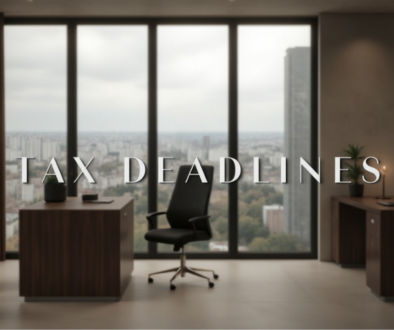Real Estate Tax Tips During the Coronavirus Pandemic: Part V
By Andrew Gradman, Esq.
Trusted Advisor at AB FinWright LLP (www.abfinwright.com) and Founder at Gradman Tax (www.gradmantax.com)
Accepted for publication in the CEB Real Property Law Reporter; reprinted with permission. The published version will reflect new developments and may contain proofreading and other changes. The author thanks Michael Wiener for comments.
This article is the fifth of a six-part series titled Real Estate Tax Tips During the Coronavirus Pandemic which describes selected deadline extensions and tax refund opportunities relating to real estate and the coronavirus pandemic.
- Introduction and overview of disaster relief provisions
- Net Operating Loss (NOL) Carrybacks (IRC §172)
- Limitation on Excess Business Losses (IRC §461(l))
- Depreciation of Qualified Improvement Property (QIP)
- Business Interest Limitation & Method for Amending Returns
- Deadlines for Qualified Opportunity Zones (IRC §1400Z-2), Like-Kind Exchanges (IRC §1031), Deadlines for Involuntary Conversion (IRC §1033), Deadlines for Low-Income Housing Tax Credits (LIHTC)
We hope you find these article written by Andrew Gradman very helpful. As always, please feel free to reach out to our office at (310) 237-3070 for a consultation on how these opportunities and provisions may help you.
Business Interest Limitation
In another uncharacteristically business-unfriendly provision, the TCJA introduced a new limit on the deductibility of non-investment interest allocable to a trade or business. See IRC §163(j). (California has not conformed.) This business interest limitation effectively increases the cost of borrowing, and is particularly onerous for real estate.
Under the TCJA, tax planning for real estate clients has typically entailed finding ways to avoid this limitation. For larger joint ventures, the only practical way out is by becoming an “electing real property trade or business,” referred to as a §163(j)(7) election. (There is another way out, but it is unavailable for registered offerings, for ventures with significant passive investment, and for ventures in which the business and its affiliates have gross receipts above $25 million.)
Before the CARES Act, owners of commercial property (including QIP) had little reason not to make the §163(j)(7) election. It merely subjected this property to alternative depreciation, increasing its recovery period by a single year, from 39 to 40 years. Alternative depreciation property also happens to be ineligible for bonus depreciation, but this was not a deterrent, because (as mentioned above) the “retail glitch” already made QIP ineligible for bonus depreciation. Now that the CARES Act retroactively treats QIP as 15-year property, these taxpayers are discovering that their decision to make the §163(j)(7) election is the only thing preventing them from enjoying bonus depreciation on these improvements. Technically, that election was “irrevocable.” See IRC §163(j)(7)(B). However, recognizing that taxpayers made the election relying on the “retail glitch,” the IRS recently released guidance allowing the election to be retroactively revoked. Rev Proc 2020-22, 2020-18 Int Rev Bull 745. The deadline to do so is October 15, 2021.
Affected taxpayers now must decide which benefit they want more: bonus depreciation on QIP (in which case they should revoke the §163(j)(7) election) or avoidance of the business interest limitation (in which case they should keep the election in place). Considering that the CARES Act also reduces the alternative depreciation period for QIP, from 40 to 20 years, some taxpayers may prefer not to revoke their §163(j)(7) election, and to continue using alternative depreciation.
Finally, note that the CARES Act also mitigates the business interest limitation in two ways. First, for tax years beginning in 2020, taxpayers may elect to use their 2019 adjusted taxable income to determine the limitation amount. Since incomes have plummeted while debt remains unchanged, this makes sense. Second, the CARES Act increases the limit on deductibility, from 30 percent to 50 percent of adjusted taxable income, for tax years beginning in 2019 (for all taxpayers except partnerships) and 2020 (for all taxpayers). For excess business interest expense which was allocated from a partnership in years beginning in 2019, partners may treat half this allocation as fully deductible in the following year.
Method for Amending Returns
New Rev Proc 2020-23, 2020-18 Int Rev Bull 749 makes it easier to amend partnership returns. In normal times, partnerships are prohibited from amending a partner’s Schedule K-1 (statement reflecting each partner’s distributive share of partnership income, gain, loss, deduction, credit, and other tax items). See IRC §6031(b). Instead, they must file an Administrative Adjustment Request under IRC §6227, meaning that refunds might not be available until 2021. To make cash available faster, Rev Proc 2020-23 creates a special procedure for tax years beginning in 2018 or 2019. For these years, partnerships have until September 30, 2020 to amend their returns and K-1s.
For NOLs arising in a year beginning in 2018 and ending by June 30, 2019, there is also an expedited procedure which can lead to a refund within 90 days of the application. See IRS Notice 2020-26. Applications under this procedure must be filed by June 30, 2020. For NOLs arising in a fiscal year that straddles 2017 and 2018, a similar expedited procedure is available, with an extended deadline of July 27, 2020. See Rev Proc 2020-24.
New Rev Proc 2020-25 also makes it easier to make or withdraw elections affecting depreciation. Specifically:
- It temporarily lets the taxpayer withdraw the (otherwise irrevocable) election to use alternative depreciation. The deadline to do so is October 15, 2021 (and not later than the statute of limitations for the year in question).
- Similarly, it temporarily lets taxpayers retroactively make (or revoke) the elections to not use (or use less) bonus depreciation using the simplified technique in Form 3115, “Application for Change in Accounting Method.” The deadlines are the same as above.
- It addresses how to retroactively fix depreciation of QIP (except that, for taxpayers who will also change their §163(j)(7) election, the subject is wholly addressed in Rev Proc 2020-22). Now that the CARES Act has cured the retail glitch, owners of QIP technically have been using an “impermissible” depreciation method in their prior returns. Rev Proc 2020-25 provides several options for retroactively choosing a correct recovery period. If the QIP has only been in service for a year, this may be done using Form 3115.




